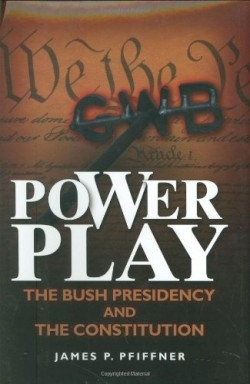Power Play
The Bush Presidency and the Constitution
- 2008 INDIES Winner
- Silver, Political Science (Adult Nonfiction)
“[The Constitutional] framers decided that the power of war be shared between the legislature and the executive. President Bush upset this balance with his assertions of unilateral authority,” the author claims in this thorough indictment of the president’s foreign policy. President Bush’s repeated evasion of the shared powers established by the Constitution has resulted in irresponsible and dangerous actions that must be challenged by the Supreme Court and the legislature: the president has not only violated constitutional laws but also older precedents of English common law, which are the basis of the American constitution, concludes the author.
Pfiffner is University Professor of Public Policy at George Mason University and his many books include The Character Factor: How We Judge America’s President and The Strategic Presidency: Hitting the Ground Running. The author builds his case against the president not only from American and English legal precedents but from the writings of political philosophers who inspired these legal works, notably John Locke, who called for the removal of a monarch who failed to protect the people’s rights of safety and liberty, and Baron de Montesquieu, who advocated the separation of powers, especially a separate judiciary not controlled by the king.
The book’s strongest chapter makes a compelling case against the president’s use of torture as a means of interrogation. Brutal measures taken against suspected terrorists at Abu Ghraib have disgraced the United States’ reputation throughout the world and have violated the Geneva Convention. The author also demonstrates that although surveillance of suspected terrorists is constitutionally legal, it should have been done in accordance with existing laws that require easily obtainable warrants.
The president is also charged for his widespread use of signing statements, which allow a president to ignore laws if he interprets them as conflicting with his presidential powers. Although the president signed Senator John McCain’s 2006 amendment to the military reauthorization act, an amendment that outlawed torture, he included a signing statement that allowed the continuation of prisoner abuse. Discussions on other signing statements, like the one appended to the Patriot Act, are also included.
This book, primarily targeted for political scientists, includes many well-reasoned arguments that are also accessible to informed general readers—arguments that will be challenged by constitutional scholars who believe that President Bush has not violated the constitution but has made full use of powers they interpret as vested in the executive branch.
Disclosure: This article is not an endorsement, but a review. The publisher of this book provided free copies of the book to have their book reviewed by a professional reviewer. No fee was paid by the publisher for this review. Foreword Reviews only recommends books that we love. Foreword Magazine, Inc. is disclosing this in accordance with the Federal Trade Commission’s 16 CFR, Part 255.

